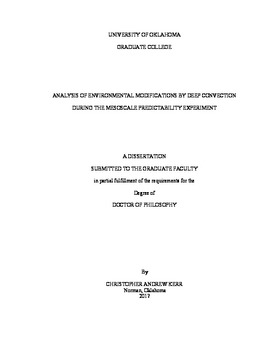| dc.contributor.advisor | Stensrud, David | |
| dc.contributor.author | Kerr, Christopher | |
| dc.date.accessioned | 2017-05-03T15:15:06Z | |
| dc.date.available | 2017-05-03T15:15:06Z | |
| dc.date.issued | 2017-05 | |
| dc.identifier.uri | https://hdl.handle.net/11244/50449 | |
| dc.description.abstract | The Mesoscale Predictability Experiment (MPEX) conducted during the spring of 2013 included frequent coordinated sampling of near-storm environments via upsondes. These unique observations were taken to better understand the upscale effects of deep convection on the environment, and are used to validate the accuracy of convection-allowing (del x = 3 km) model ensemble analyses. A 36-member ensemble was created with physics diversity using the Weather Research and Forecasting model, and observations were assimilated via the Data Assimilation Research Testbed using an ensemble adjustment Kalman filter. A four-day sequence of convective events from 28-31 May 2013 in the south central United States was analyzed by assimilating Doppler radar and conventional observations. No MPEX upsonde observations were assimilated. Since the ensemble mean analyses produce an accurate depiction of the storms, the MPEX observations are used to verify the accuracy of the analyses of the near-storm environment.
The MPEX observations reveal modest analysis errors overall when considering all samples, although specific environmental regions reveal larger errors in some state fields. Since the environmental ensemble analyses have been thoroughly verified, convection-allowing models are used to assess the short-term (1-2 hours) impacts of convection on the surrounding environment. Convection evolution dependencies on the environment are assessed using the ensemble sensitivity technique. This includes forecast proxies for various hazards including tornadoes, hail, and damaging winds. Results suggest scenarios where environmental modifications by convection are significant in further convection evolution, supporting the notion of storm-environment feedbacks. | en_US |
| dc.language | en_US | en_US |
| dc.subject | Severe convection | en_US |
| dc.subject | Data assimilation | en_US |
| dc.subject | Numerical weather prediction | en_US |
| dc.title | Analysis of environmental modifications by deep convection during the Mesoscale Predictability Experiment | en_US |
| dc.contributor.committeeMember | Wang, Xuguang | |
| dc.contributor.committeeMember | Cavallo, Steven | |
| dc.contributor.committeeMember | Coniglio, Michael | |
| dc.contributor.committeeMember | Shapiro, Alan | |
| dc.contributor.committeeMember | Lakshmivarahan, S. | |
| dc.date.manuscript | 2017-04 | |
| dc.thesis.degree | Ph.D. | en_US |
| ou.group | College of Atmospheric & Geographic Sciences::School of Meteorology | en_US |
| shareok.nativefileaccess | restricted | en_US |
